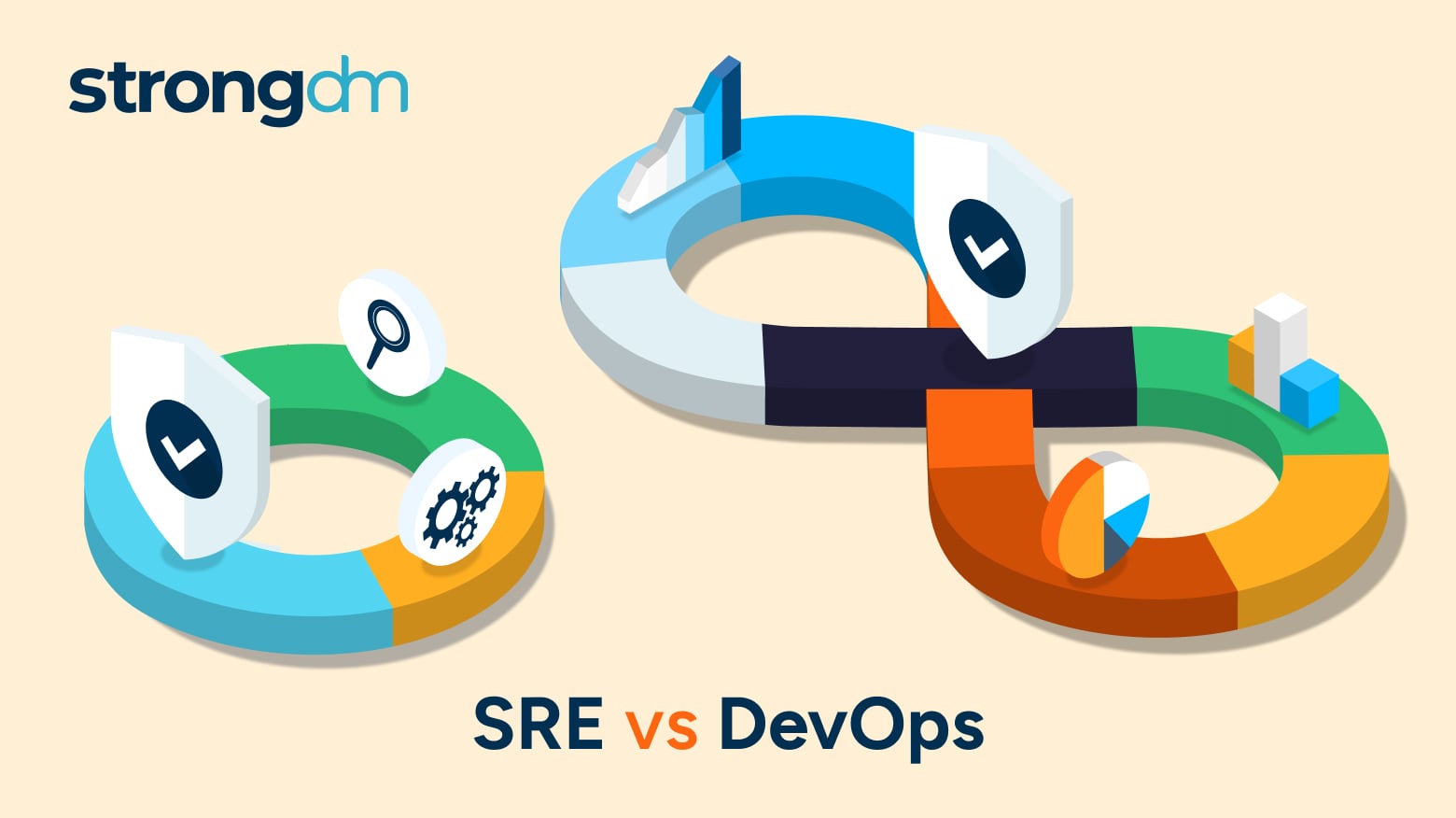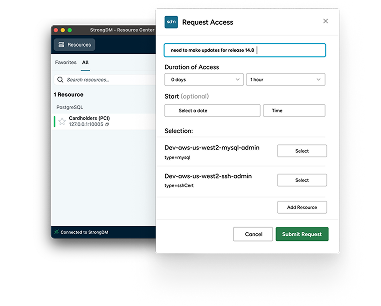

Written by
Maile McCarthyLast updated on:
September 6, 2024Reading time:
Contents
Built for Security. Loved by Devs.
- Free Trial — No Credit Card Needed
- Full Access to All Features
- Trusted by the Fortune 100, early startups, and everyone in between
Summary: DevOps is a combination of “development” and “operations” and is a set of practices that combine these two disciplines. SRE stands for Site Reliability Engineering and is a principle that applies software engineering practices to infrastructure and operations to improve site reliability. This new IT discipline is evolving, so its differentiation from DevOps isn’t always clear. The information we share here will help you better grasp these two roles and where they intersect. After reading this article, you’ll have a solid understanding of what SRE is, why it matters, and how it’s related to DevOps.
What Are SRE and DevOps?
Although the concept of Site Reliability Engineering has been around since 2003, SRE has become a hot buzzword in recent years.
Why?
Because forward-thinking IT companies are looking to decentralize software engineering. They’re putting greater emphasis on SRE in their quest to create more balance between day-to-day DevOps functions, like ongoing product maintenance and releasing new features, and longer-term goals, like ensuring scalability and long-term reliability.
Over 60% of SREs and DevOps specialists report their greatest challenge is a lack of clarity between ownership boundaries.
What is Site Reliability Engineering (SRE)?
What does SRE stand for? Site Reliability Engineering. This IT role focuses on service management and application lifecycles.
Site reliability engineers consider issues such as scalability, observability, reliability, latency, availability, and capacity, and suggest solutions to improve each of these aspects of system performance.
Typically, they are also the first line of response when a website or application slows or crashes. Their goal is to ensure the stability of production environments.
“SRE is […] really just a practice within the current DevOps evolution.” — Tim Yokum, InfluxData
What is DevOps?
DevOps is the traditional approach to managing the software development lifecycle. It comprises the solutions, methods, and best practices engineers use to architect, code, test, and deliver software products. DevOps relies on continuous integration and continuous delivery (CI/CD) pipelines and automation tools to update applications and maintain consistency across different software versions and deployment environments.
SRE vs. DevOps: What's the Difference?
The major difference between these two concepts is that DevOps tends to be more execution focused, whereas SRE is more operational.
DevOps concentrates on building, testing, and releasing software that addresses specific business needs. SRE focuses on operational issues, such as reducing risk, eliminating redundancy, increasing resiliency, and improving efficiency.
Think of SRE and DevOps as two sides of the same coin. These roles are complementary and work together toward the same goals while approaching engineering from slightly different angles. Improving efficiency is where these two disciplines intersect. They simply achieve this goal in different areas of IT.
While DevOps engineers are fixing bugs and coding new features, SREs are fanatics about uptime. SREs are always plotting out the future of the product with long-term sustainability in mind. At smaller companies, it’s common to distribute the SRE function throughout DevOps. Large companies often have more clearly defined SRE roles.
| DevOps | SRE |
|---|---|
| Building software | Reducing risk |
| Testing software | Eliminating redundancy |
| Releasing software | Increasing resilience |
| Fixing bugs | Improving uptime |
| Coding new features | Building sustainability |
| Improving efficiency | Improving efficiency |
SLAs, SLOs, and SLIs
SRE defines three service level commitments to measure how well an application performs: SLA, SLO, and SLI.
SLAs
A service level agreement (SLA) is a pre-established business agreement between a client and a service provider. It outlines the services a provider promises to offer and the standards users expect, such as the desired levels of reliability, performance, and latency.
SLOs
Service level objectives (SLOs) are the target metrics SREs set to satisfy the terms and goals specified in SLAs. SLOs focus on setting expectations within the site reliability engineering team.
Site reliability engineers can use SLOs as internal currency to keep everyone focused on what really matters—primarily, building more reliable applications without getting bogged down in business-side metrics like SLAs.
SLIs
Service level indicators (SLIs) measure how well a system adheres to pre-defined SLOs. SLIs provide real-time insight into system reliability. Examples of SLI metrics include development frequency, throughput, request latency, lead time, mean time to restore (MTTR), and the availability error rate.
“If you're in this pretend world where we say everything is five nines all the time, well, either you're incredibly rich, or incredibly brilliant and incredibly lucky.” — Greg Leffler, Splunk
The Relationship Between SRE and DevOps
SRE applies aspects of software engineering to infrastructure and operations problems to create scalable and reliable software systems. While SRE and DevOps are complementary, whether these methodologies work in parallel or overlap largely depends on the organization.
DevOps teams comprise software architects, developers, QA engineers, testers, and other specialized roles. At a smaller organization without a dedicated SRE, a more experienced DevOps team member might take on SRE responsibilities. However, large enterprises often have teams of SREs with deep expertise in both development and operations.
Want to take a deep dive into SRE and DevOps with our panel of experts? Check out our webinar "At the Intersection of SRE & DevOps."
Benefits of SRE and DevOps
SRE and DevOps provide many advantages to organizations that have both. But what benefits does each approach contribute individually? Let’s look at the advantages of DevOps vs. Site Reliability Engineering.
What are the benefits of SRE?
The biggest benefit of SRE is increased uptime. SREs aim to keep systems running continuously by minimizing interruptions and downtime. To maximize system availability, SREs focus on fine-tuning the operations side of things. They prioritize issues such as reliability, redundancy, performance, and disaster management.
Site Reliability Engineering gives companies a competitive edge by automating manual tasks. When developers are relieved of routine chores, they have more time to be creative. This allows them to innovate and build better solutions. Engineering teams that include SRE in their development process operate more efficiently. With SRE, problems can be identified sooner and resolved faster.
What are the benefits of DevOps?
DevOps offers a wide range of benefits, all of which contribute to the effective management of engineering initiatives. DevOps professionals leverage the power of automation to streamline and accelerate the development process, so product improvements and new features can deliver value to customers faster.
DevOps uses agile methodology to design, test, and deploy software updates quickly while ensuring quality remains high. This iterative approach focuses on making incremental changes. When the differences between software versions are smaller, fewer bugs need to be fixed later.
DevOps increases team productivity, reduces development costs, improves stability by lowering the risk of serious errors, and simplifies software development lifecycle (SDLC) management.
Challenges of SRE and DevOps
Because SRE and DevOps teams view the development process from different perspectives, each approach has different responsibilities and faces unique obstacles. Let’s compare the DevOps vs. SRE responsibilities and see how their challenges differ.
What are the challenges of SRE?
Perhaps the biggest challenge of SRE is finding qualified candidates. In terms of skills for a site reliability engineer vs. DevOps, the SRE role requires a seasoned professional who possesses a broader range of skills and experience than a DevOps engineer. The difference between a DevOps vs. SRE salary can be significant, with SREs earning considerably more.
It’s very difficult to recruit SRE candidates because HR job descriptions often list too many requirements. Anyone who enjoys troubleshooting and appreciates learning should be considered part of the talent pipeline.
“Bust through that ‘10 years of SRE experience’ or ‘200 years of Kubernetes experience’ job requirement.” — Justin McCarthy, StrongDM
Below are some additional examples of the issues Site Reliability Engineering teams must overcome as they work to optimize development processes and minimize the frequency and impact of failures:
- Maintaining a high level of system availability at all times
- Monitoring systems to ensure performance metrics are met
- Detecting incidents and determining the root cause
- Automating manual tasks to improve workflow and reduce errors
- Troubleshooting and debugging systems
- Addressing and tracking security vulnerabilities
- Developing and revising best practices
What are the challenges of DevOps?
One of the biggest obstacles DevOps organizations face is gaining mastery over the best practices that enable continuous delivery.
While continuous integration (CI) and continuous delivery (CD) are both important in DevOps, 44% of software developers use either CI or CD, but not both. These two practices are complementary. But most developers focus on CI because CD requires expertise that few engineers have. This is especially true at smaller companies.
Almost 60% of enterprise software developers use a CI/CD platform.
DevOps also wrestles with test automation. Extensive customizations add complexity and introduce unique challenges that make it difficult to automate deployment across multiple platforms.
However, as organizations increasingly move toward Kubernetes clusters, it will become progressively easier to automate software delivery for platforms that share a common application programming interface (API).
SRE and DevOps Tools: How to Choose the Right Ones
While DevOps emphasizes development, SRE focuses on monitoring and incident management. Observability is key to Site Reliability Engineering. Whether they’re looking at access observability, application data, or Twitter sentiment, SREs help organizations prioritize what matters most—from keeping customers happy to meeting SLOs.
“If you are [...] architecting reliability into your services, or architecting resilience into your world, you have to have observability as part of that. There’s no way to do it without it.” — Greg Leffler, Splunk
SREs need application release and deployment management tools, plus tools that provide deep observability into the entire IT environment. It’s critical to select the right tools that not only provide monitoring capabilities but also enable configuring the desired metrics.
An SRE’s toolkit should also include an automated incident response system and real-time communication apps.
How StrongDM Helps Both SREs and DevOps
Without the right tools, observability and monitoring can be a nightmare for site reliability engineers. These tasks are critical to defending your organization’s security perimeter against attacks from unauthorized users.
StrongDM’s Zero Trust PAM platform streamlines monitoring by limiting which users can access your IT infrastructure and giving your team deep insights across the entire tech stack.
With StrongDM’s extensive observability and monitoring capabilities, you can turn your SRE team’s nightmare into a dream while securing your IT environments with a Zero Trust security model. Get a free, no-BS demo of StrongDM today.
Next Steps
StrongDM unifies access management across databases, servers, clusters, and more—for IT, security, and DevOps teams.
- Learn how StrongDM works
- Book a personalized demo
- Start your free StrongDM trial


About the Author
Maile McCarthy, Contributing Writer and Illustrator, has a passion for helping people bring their ideas to life through web and book illustration, writing, and animation. In recent years, her work has focused on researching the context and differentiation of technical products and relaying that understanding through appealing and vibrant language and images. She holds a B.A. in Philosophy from the University of California, Berkeley. To contact Maile, visit her on LinkedIn.
You May Also Like




